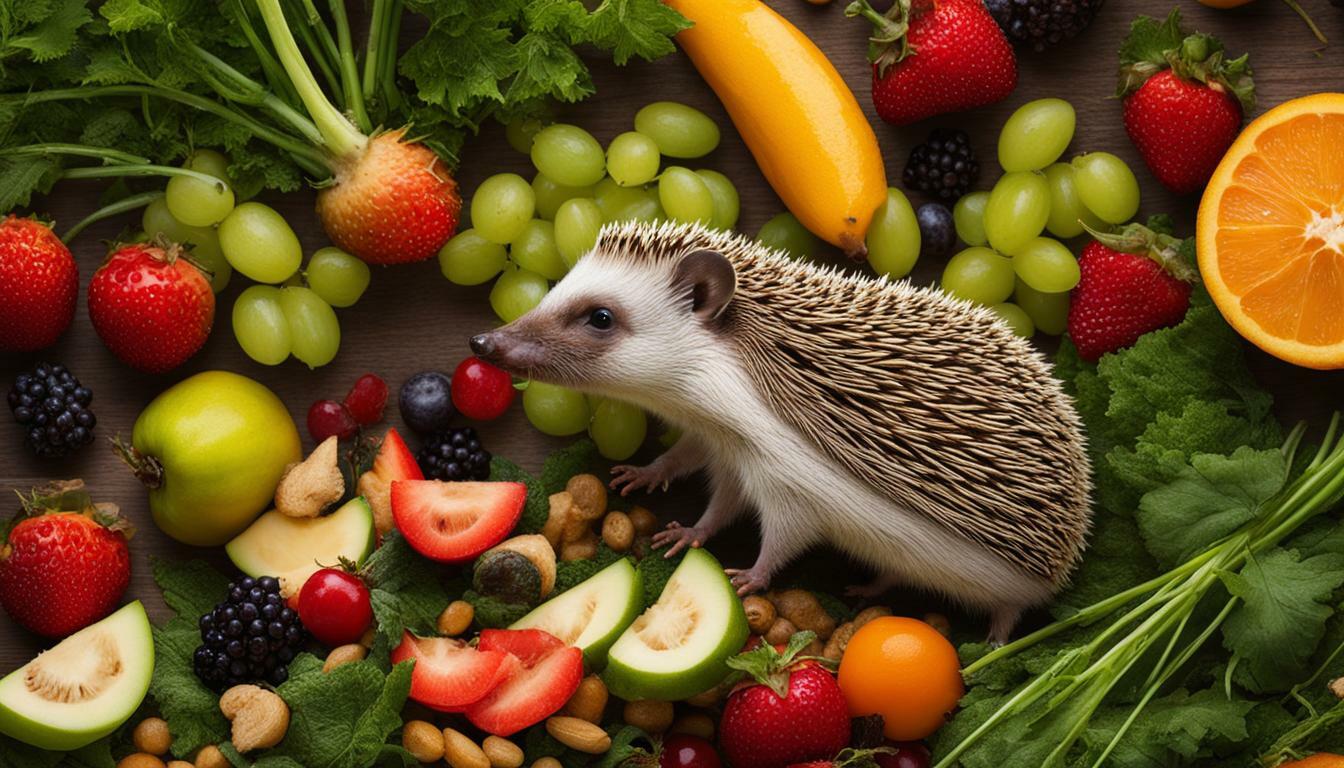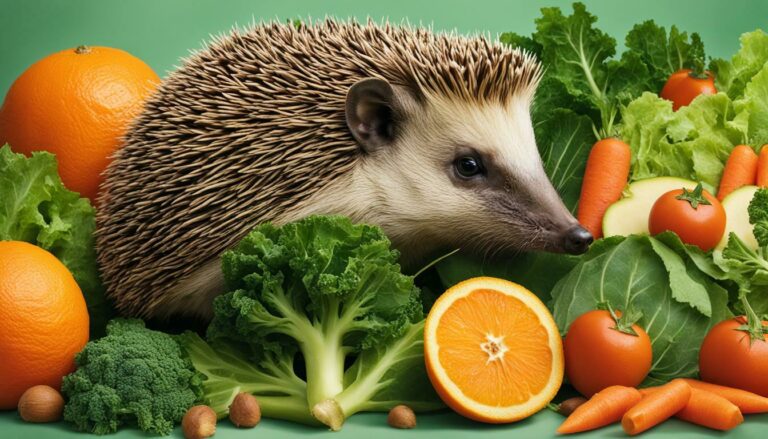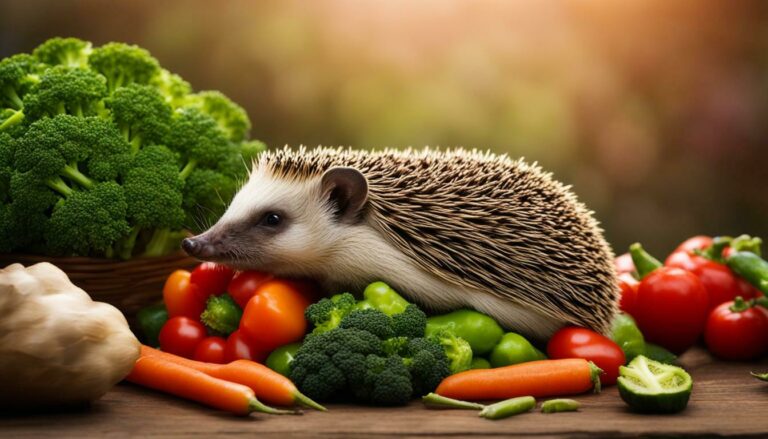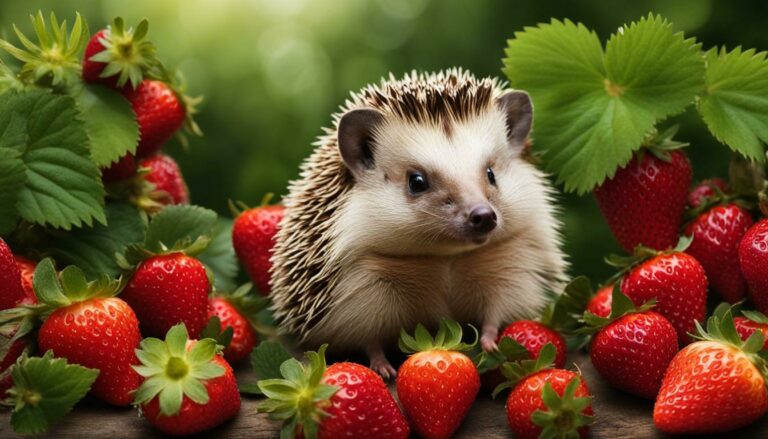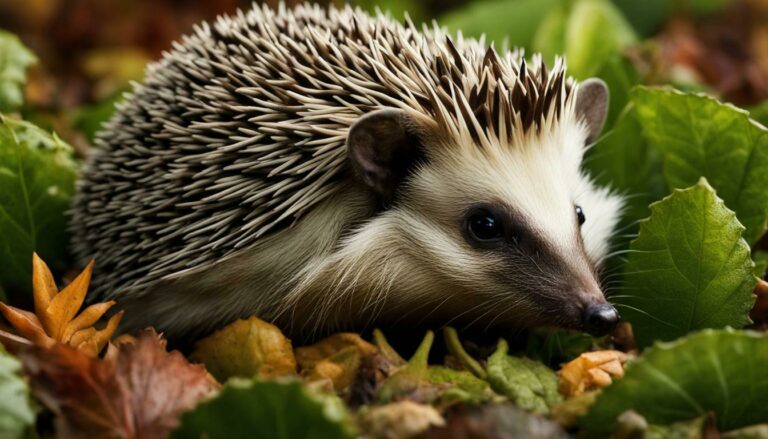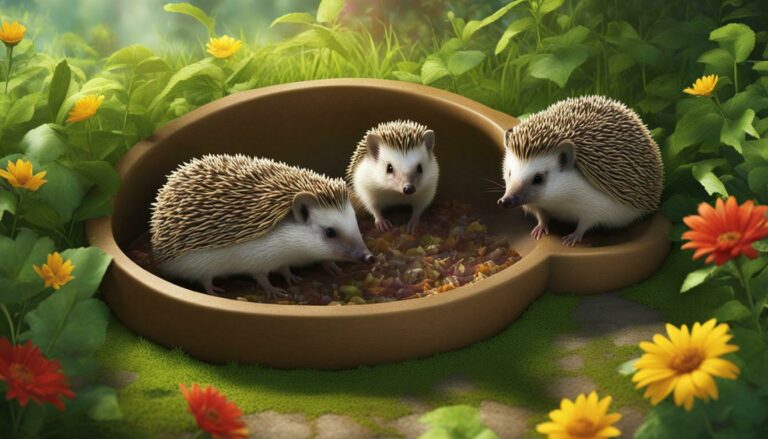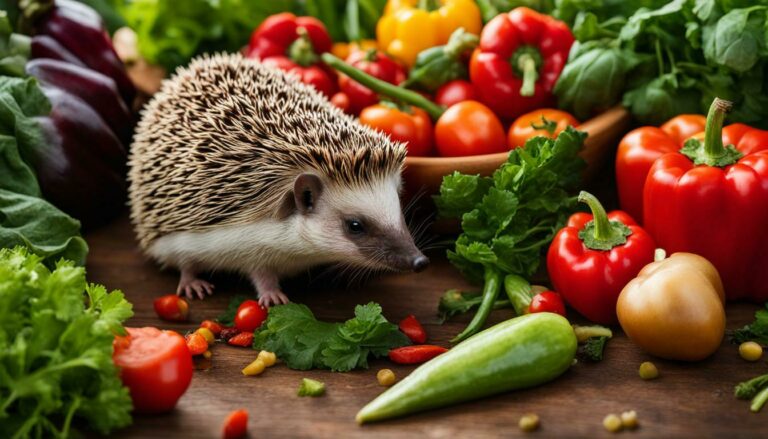Can Hedgehogs Eat Grass? Uncovering the Hedgehog Diet Mystery
Many pet owners wonder if hedgehogs can safely consume grass as part of their diet, but the truth is that while hedgehogs can technically eat grass, it is not a natural or recommended part of their diet. Grass is difficult for hedgehogs to digest, and it can potentially cause digestion problems and impactions. Additionally, outdoor grass may contain pesticides and fertilizers that can be harmful to hedgehogs.
Key Takeaways:
- Hedgehogs can eat grass, but it is not a natural or recommended part of their diet.
- Grass can cause digestion problems and impactions for hedgehogs.
- Outdoor grass may contain pesticides and fertilizers that are harmful to hedgehogs.
The Hedgehog’s Natural Diet
In the wild, hedgehogs primarily feed on a variety of insects and consume small amounts of plant material, making their diet predominantly carnivorous with some omnivorous tendencies. They have a strong preference for insects, which provide them with the majority of their caloric intake. Hedgehogs are skilled hunters and use their keen sense of smell and hearing to locate their prey. They feed on small snakes, mice, slugs, snails, worms, and frogs, among other small invertebrates.
While insects make up the bulk of their diet, hedgehogs also eat a small amount of plant material. They may consume fruits, vegetables, and even some plant matter found in their natural habitat. However, the plant material they consume is typically limited and serves more as a supplement to their insect-rich diet.
When it comes to pet hedgehogs, their diet should mimic their natural feeding habits as closely as possible. The primary food source should consist of a variety of insects, such as crickets and worms, which can be purchased from pet stores. These insects should be gut-loaded with nutritious vegetables to ensure that the hedgehog is receiving essential vitamins and minerals.
In addition to insects, a small amount of vegetables and fruits can be offered to pet hedgehogs. However, it is important to choose the right ones. Leafy greens like broccoli and cucumbers are excellent choices, as they are nutrient-dense and low in water content. Brightly colored vegetables, such as bell peppers and carrots, also provide important nutrients. It is crucial to avoid feeding hedgehogs vegetables that are high in water and low in nutritional value, like lettuce and celery. Toxic foods like avocadoes should also be avoided.
| Insects | Vegetables | Fruits |
|---|---|---|
| Crickets | Broccoli | Berries |
| Mealworms | Cucumbers | Melon |
| Waxworms | Bell peppers | Apples |
It is important to monitor the food intake of pet hedgehogs to prevent overeating and obesity. Food should be given in measured proportions, and treats like fruits should be offered sparingly. Providing a balanced and nutritious diet is essential for the overall health and well-being of pet hedgehogs.
Grass and its Implications for Hedgehogs
While hedgehogs can technically eat grass, it is not recommended due to the challenges they face in digesting it and the potential risks it poses to their health. Hedgehogs lack the enzymes and stomach setup necessary to properly digest grass, making it difficult for them to break down and process it. This can lead to digestive issues, including impactions, which can be serious and may require surgery to remove the blockage.
In addition to the digestion challenges, grass can also contain pesticides and fertilizers if it has been maintained, which can cause an upset stomach and potentially harm the hedgehog. Even grass grown indoors without these chemicals should not be seen as a regular or healthy option, as it provides little to no nutritional benefits for hedgehogs.
It is important to note that while hedgehogs may occasionally nibble on grass, they do not recognize it as a primary food source and are unlikely to consume it in large quantities. Grass is essentially just filler in their diet, offering little nutritional value and preventing them from eating more appropriate and nutrient-rich foods. Extended consumption of grass can lead to nutritional deficiencies, especially if the hedgehog is not getting enough protein from insects, which are a crucial part of their diet.
To ensure a healthy and balanced diet for your pet hedgehog, it is best to provide them with a variety of different insects as their main food source. These insects should be gut-loaded with vegetables to ensure they are as nutritious as possible. Some common options include crickets and worms. Additionally, a small amount of fruits and vegetables can be offered, but it is important to choose nutrient-dense options and avoid those that are high in water content or toxic to hedgehogs, such as lettuce and avocadoes.
| Veggies | Recommended | Avoid |
|---|---|---|
| Leafy Greens | Broccoli, kale, spinach | Lettuce, celery |
| Brightly Colored Veggies | Bell peppers, carrots | |
| Peas and Corn | Small amounts of peas for protein | Large amounts of corn leading to obesity |
| Potatoes | Avoid as they are too starchy |
It is important to monitor your hedgehog’s food intake to prevent overeating and obesity. Providing measured portions of food and avoiding excessive grass consumption can help ensure your hedgehog stays healthy and receives the necessary nutrients for optimal well-being.
Conclusion
While hedgehogs can technically eat grass, it is not a recommended part of their diet. Grass poses digestion challenges and may contain harmful chemicals. Instead, providing a balanced and nutritious diet that includes a variety of insects and appropriate fruits and vegetables is essential for your hedgehog’s overall health and well-being.
A Suitable Diet for Hedgehogs
To meet the nutritional needs of pet hedgehogs, it is essential to provide a balanced diet that consists mainly of a variety of insects, supplemented with appropriate fruits and vegetables. Hedgehogs are primarily insectivores, and their diet in the wild consists of a wide range of insects, such as crickets and worms. These insects should preferably be gut-loaded with high-quality vegetables to ensure that the hedgehog is receiving the necessary vitamins and nutrients.
In addition to insects, a small amount of fruits and vegetables can be offered to hedgehogs. However, it’s important to choose the right ones. Avoid vegetables that are high in water content and low in nutritional value, such as lettuce and celery. Opt for leafy greens like broccoli and dark green vegetables, as they are nutrient-dense and low in water content. Brightly colored vegetables, like bell peppers and carrots, are also good options as they contain a variety of nutrients.
It’s crucial to source the insects from pet stores rather than collecting them from the wild. Wild-caught insects may contain insecticides, fertilizers, and parasites that can be harmful to hedgehogs. Raising your own insects can be a cost-effective option, especially if you have multiple hedgehogs to feed. However, be mindful of maintaining a proper breeding colony to ensure a sustainable supply of insects.
It’s important to monitor your hedgehog’s food intake and avoid overfeeding. Hedgehogs have a tendency to overeat, which can lead to obesity and other health issues. It’s recommended to provide measured portions of food to prevent excessive consumption.
| Recommended Foods for Hedgehogs | Foods to Avoid |
|---|---|
| Various insects (crickets, worms) | Lettuce |
| Leafy greens (broccoli, kale) | Celery |
| Brightly colored vegetables (bell peppers, carrots) | Avocado |
| Fruits in moderation | Potatoes |
By providing a varied and nutritious diet, you can ensure the overall health and well-being of your pet hedgehog. Remember to consult with a veterinarian experienced in hedgehog care for specific dietary recommendations based on your hedgehog’s individual needs.
Conclusion
While hedgehogs may have the ability to eat grass, it is best to avoid including it in their diet and instead focus on providing them with a balanced and nutritious diet that meets their specific needs. Grass is not a natural part of a hedgehog’s diet, and consuming it can lead to digestion problems and potential health issues such as impactions. Furthermore, grass grown outdoors may contain pesticides and fertilizers that can be harmful to hedgehogs.
It is important to understand that hedgehogs are primarily insectivores, with a preference for insects as their main source of nutrition. They should be fed a variety of different insects, such as crickets or worms, which are gut-loaded with high-quality vegetables for added nutritional value.
While a small amount of fruits and vegetables can be offered as well, it is crucial to choose the right ones. Avoid vegetables that are high in water and low in nutritional value, like lettuce and celery. Opt for nutrient-dense options such as dark green leafy vegetables, brightly colored vegetables like bell peppers and carrots, and peas for their protein content. However, it is important to note that peas and corn should be fed in moderation due to their starchier nature.
When feeding hedgehogs, it is recommended to source insects from pet stores rather than relying on wild-caught insects, as they may contain harmful substances or parasites. You can also consider raising your own insects for your hedgehog’s diet, although the cost savings may not be significant for a single pet hedgehog.
Monitoring your hedgehog’s food intake is crucial to prevent overeating and obesity. Always provide measured portions of food and avoid feeding them too much grass, as it offers little nutritional value and may lead to nutritional deficiencies if consumed in excess. By providing a suitable diet that meets their natural nutritional needs, you can ensure the overall health and well-being of your pet hedgehog.
FAQ
Q: Can hedgehogs eat grass?
A: Hedgehogs can technically eat grass, but it is not a natural part of their diet and can potentially cause digestion problems. Grass is difficult for hedgehogs to digest and can lead to impactions and other issues. Additionally, grass found outdoors may contain pesticides and fertilizers that are harmful to hedgehogs. Therefore, it is not recommended to feed grass to hedgehogs.
Q: What is the natural diet of hedgehogs?
A: Hedgehogs are omnivores that primarily eat a variety of insects as their main food source. Some larger hedgehogs may also eat small amounts of meat, usually in the form of baby mammals like mice. They can also consume a small number of nutrient-dense veggies and fruits.
Q: Why is grass not a suitable snack for hedgehogs?
A: Grass is not nutritionally complete and does not provide many benefits for hedgehogs. It can cause nutritional deficiencies and prevent them from eating more appropriate and nutritious food. Grass can also lead to digestion problems and impactions in hedgehogs.
Q: What should hedgehogs be fed instead of grass?
A: Hedgehogs should be fed a variety of different insects as their main food source. These insects should ideally be gut-loaded with high-quality veggies to ensure the hedgehog is getting enough vitamins. Some suitable veggies and fruits can also be offered, but it is important to choose nutrient-dense options that are low in water content.
Q: Can hedgehogs eat grass grown indoors?
A: Grass grown indoors may not contain pesticides and fertilizers, but it is still not a recommended food choice for hedgehogs. Grass offers little nutritional value and may prevent hedgehogs from consuming more appropriate foods. It is best to stick to a balanced diet of insects and suitable fruits and veggies for hedgehogs.
